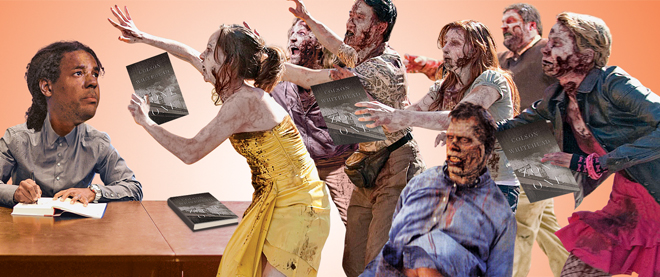Zombie lit: The undead go highbrow
A new generation of writers puts some pulp into fiction
Getty Images: Photo Illustration by Sarah MacKinnon
Share

If you want to understand the current wave of genre-flecked, highbrow American fiction writers—the Colson Whiteheads and Jonathan Lethems erecting literary skyscrapers around pulpy frames—you could do worse than reading the first line of an essay Lethem wrote for The New Yorker in 2002: “In the summer of 1977, I saw Star Wars 21 times,” Lethem started, “mostly by myself.”
Lethem has serious sci-fi chops. His first novel, Gun, With Occasional Music, was set in a dystopian future where kangaroo gangsters coexist with classic American gumshoes. But he became famous in mainstream circles first for Motherless Brooklyn, a detective novel whose hero has Tourette’s syndrome, and later Fortress of Solitude, a coming-of-age tale that blends comic books and soul music with more traditional literary fare.
Along with Michael Chabon, who wrote a speculative detective novel of his own, Lethem is often cited as a leader in a new class of genre-blending novelists—writers unafraid to borrow from fantasy, horror or comic books in their so-called serious fiction. The newest entry in that field is Whitehead’s Zone One, a post-apocalyptic zombie novel, out this month. Zone One is at once true to its genre—there are moments of legitimate horror in this book—and something entirely new. A meditation on loneliness and mediocrity, it is funny and strange and wholly relevant to the world we live in now.
What Whitehead shares with Lethem and Chabon is a refusal to shrink from the pop culture that created him. In the same way Philip K. Dick and Ursula K. Le Guin shaped Lethem’s early fiction, the slasher flicks and pulp literature Whitehead absorbed as a child bleed into his work today. “Reading horror comic books and Stephen King made me want to be a writer,” he told Maclean’s in an interview. “Making up fantastic and horrible tales and not leaving the house seemed like a pretty good gig.”
Whitehead’s first novel, The Intuitionist, had the same genre-bending feel as Zone One. Inspired by old-school detective fiction, the book existed in a New York where elevator inspectors operate as clannish power brokers. His more recent work, most notably 2009’s Sag Harbor, has been more obviously literary. But Whitehead doesn’t see Zone One as a departure or step back. To him, the new book is less a capital-Z zombie novel than it is a vehicle for character exploration. “The people come before the monsters,” he says.
Still, his monsters do deserve mention. The zombies in Zone One are a mix of the traditionally flesh-hungry breed—called skels, here—and stragglers, a new creation less starved for brains than for some element of their old lives. In that way, the monsters are like the book itself, both tied to an older storytelling tradition and, at the same time, something novel.
The idea of mixing high- and lowbrow, of blending adventure stories or genre fiction with what Chabon calls “late-century naturalism” isn’t exactly new. (Toni Morrison’s Beloved is basically a ghost story, Whitehead points out.) And the line between “literature” and “fiction” is as much a creation of bookstores as it is anything else. There is good genre writing (Whitehead spent the summer reading George R. R. Martin’s Game of Thrones, a massively popular fantasy series recently adapted for television by HBO, for example) and bad literature (take your pick). Closer to home, two of Canada’s most famous writers—Margaret Atwood and Guy Gavriel Kay—have been pushing the boundaries of genre and literature from opposite ends for decades.
At the same time, there is something distinct about the work of Whitehead and his peers. They are, essentially, the first generation raised on pop culture, the first one to see Star Wars 21 times or to rent My Bloody Valentine on VHS. For Whitehead and Lethem, genre stories are part of the landscape of their imaginations, no less influential than the physical geographies in which they were raised. “I wanted to pay tribute to the things that had influenced me,” Whitehead says about Zone One. And those things, like it or not, are pulpy.